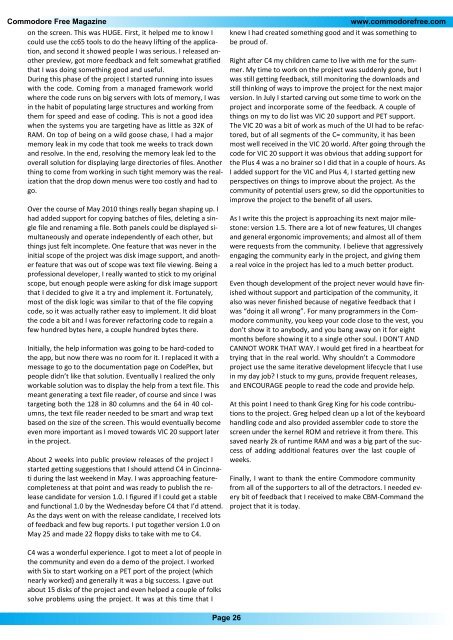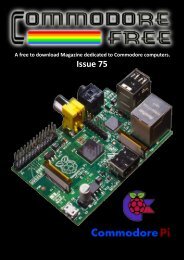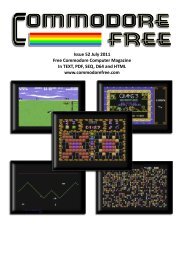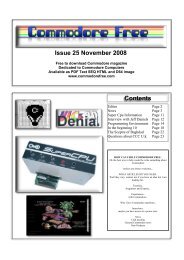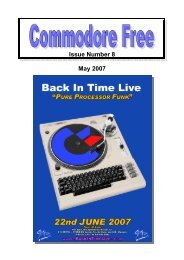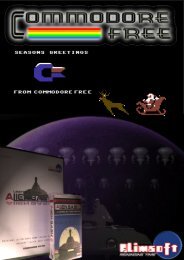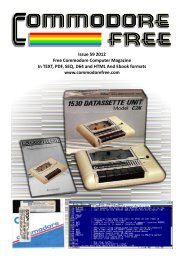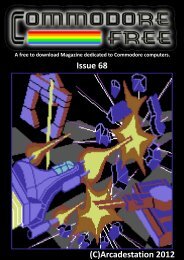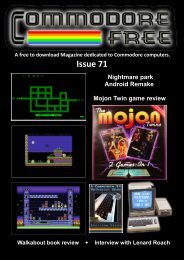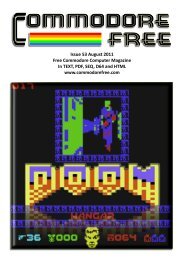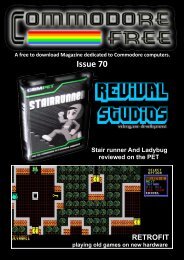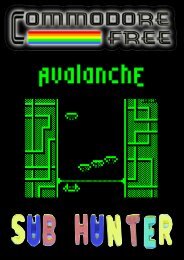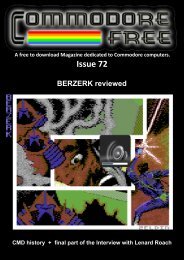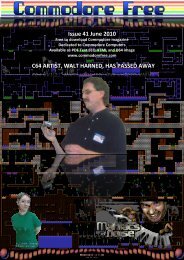Issue 44 September 2010 - Commodore Free
Issue 44 September 2010 - Commodore Free
Issue 44 September 2010 - Commodore Free
Create successful ePaper yourself
Turn your PDF publications into a flip-book with our unique Google optimized e-Paper software.
<strong>Commodore</strong> <strong>Free</strong> Magazine<br />
on the screen. This was HUGE. First, it helped me to know I<br />
could use the cc65 tools to do the heavy lifting of the application,<br />
and second it showed people I was serious. I released another<br />
preview, got more feedback and felt somewhat gratified<br />
that I was doing something good and useful.<br />
During this phase of the project I started running into issues<br />
with the code. Coming from a managed framework world<br />
where the code runs on big servers with lots of memory, I was<br />
in the habit of populating large structures and working from<br />
them for speed and ease of coding. This is not a good idea<br />
when the systems you are targeting have as little as 32K of<br />
RAM. On top of being on a wild goose chase, I had a major<br />
memory leak in my code that took me weeks to track down<br />
and resolve. In the end, resolving the memory leak led to the<br />
overall solution for displaying large directories of files. Another<br />
thing to come from working in such tight memory was the realization<br />
that the drop down menus were too costly and had to<br />
go.<br />
Over the course of May <strong>2010</strong> things really began shaping up. I<br />
had added support for copying batches of files, deleting a single<br />
file and renaming a file. Both panels could be displayed simultaneously<br />
and operate independently of each other, but<br />
things just felt incomplete. One feature that was never in the<br />
initial scope of the project was disk image support, and another<br />
feature that was out of scope was text file viewing. Being a<br />
professional developer, I really wanted to stick to my original<br />
scope, but enough people were asking for disk image support<br />
that I decided to give it a try and implement it. Fortunately,<br />
most of the disk logic was similar to that of the file copying<br />
code, so it was actually rather easy to implement. It did bloat<br />
the code a bit and I was forever refactoring code to regain a<br />
few hundred bytes here, a couple hundred bytes there.<br />
Initially, the help information was going to be hard-coded to<br />
the app, but now there was no room for it. I replaced it with a<br />
message to go to the documentation page on CodePlex, but<br />
people didn’t like that solution. Eventually I realized the only<br />
workable solution was to display the help from a text file. This<br />
meant generating a text file reader, of course and since I was<br />
targeting both the 128 in 80 columns and the 64 in 40 columns,<br />
the text file reader needed to be smart and wrap text<br />
based on the size of the screen. This would eventually become<br />
even more important as I moved towards VIC 20 support later<br />
in the project.<br />
About 2 weeks into public preview releases of the project I<br />
started getting suggestions that I should attend C4 in Cincinnati<br />
during the last weekend in May. I was approaching featurecompleteness<br />
at that point and was ready to publish the release<br />
candidate for version 1.0. I figured if I could get a stable<br />
and functional 1.0 by the Wednesday before C4 that I’d attend.<br />
As the days went on with the release candidate, I received lots<br />
of feedback and few bug reports. I put together version 1.0 on<br />
May 25 and made 22 floppy disks to take with me to C4.<br />
www.commodorefree.com<br />
knew I had created something good and it was something to<br />
be proud of.<br />
Right after C4 my children came to live with me for the summer.<br />
My time to work on the project was suddenly gone, but I<br />
was still getting feedback, still monitoring the downloads and<br />
still thinking of ways to improve the project for the next major<br />
version. In July I started carving out some time to work on the<br />
project and incorporate some of the feedback. A couple of<br />
things on my to do list was VIC 20 support and PET support.<br />
The VIC 20 was a bit of work as much of the UI had to be refactored,<br />
but of all segments of the C= community, it has been<br />
most well received in the VIC 20 world. After going through the<br />
code for VIC 20 support it was obvious that adding support for<br />
the Plus 4 was a no brainer so I did that in a couple of hours. As<br />
I added support for the VIC and Plus 4, I started getting new<br />
perspectives on things to improve about the project. As the<br />
community of potential users grew, so did the opportunities to<br />
improve the project to the benefit of all users.<br />
As I write this the project is approaching its next major milestone:<br />
version 1.5. There are a lot of new features, UI changes<br />
and general ergonomic improvements; and almost all of them<br />
were requests from the community. I believe that aggressively<br />
engaging the community early in the project, and giving them<br />
a real voice in the project has led to a much better product.<br />
Even though development of the project never would have finished<br />
without support and participation of the community, it<br />
also was never finished because of negative feedback that I<br />
was “doing it all wrong”. For many programmers in the <strong>Commodore</strong><br />
community, you keep your code close to the vest, you<br />
don’t show it to anybody, and you bang away on it for eight<br />
months before showing it to a single other soul. I DON’T AND<br />
CANNOT WORK THAT WAY. I would get fired in a heartbeat for<br />
trying that in the real world. Why shouldn’t a <strong>Commodore</strong><br />
project use the same iterative development lifecycle that I use<br />
in my day job? I stuck to my guns, provide frequent releases,<br />
and ENCOURAGE people to read the code and provide help.<br />
At this point I need to thank Greg King for his code contributions<br />
to the project. Greg helped clean up a lot of the keyboard<br />
handling code and also provided assembler code to store the<br />
screen under the kernel ROM and retrieve it from there. This<br />
saved nearly 2k of runtime RAM and was a big part of the success<br />
of adding additional features over the last couple of<br />
weeks.<br />
Finally, I want to thank the entire <strong>Commodore</strong> community<br />
from all of the supporters to all of the detractors. I needed every<br />
bit of feedback that I received to make CBM-Command the<br />
project that it is today.<br />
C4 was a wonderful experience. I got to meet a lot of people in<br />
the community and even do a demo of the project. I worked<br />
with Six to start working on a PET port of the project (which<br />
nearly worked) and generally it was a big success. I gave out<br />
about 15 disks of the project and even helped a couple of folks<br />
solve problems using the project. It was at this time that I<br />
Page 26


